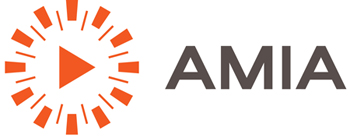Livestreaming from AMIA 2018
Ten sessions from AMIA 2018 on Friday and Saturday, November 30th and December 1st were live-streamed. Click the play button to see the recordings of the sessions.
![]()
Five sessions from the No Islands In This Stream: Building, Maintaining and Sharing Regional and Community Archives program stream –
A wide variety of institutions, including university archives, public libraries, museums, historical societies, non-profits, and even corporate entities are the custodians of growing amounts of community and regional moving images. No Islands In This Stream: Building, Maintaining and Sharing Regional and Community Archives is a day of curated programming that focuses on the wide variety of topics relevant to building and maintaining regional and community moving image archives. This five panel stream was built to create an inclusive and welcoming space that will facilitate productive conversations between professionals with differing levels of experience and create lasting collaborations between geographically distant and diverse institutions. We hope that conversations occurring during these sessions will provide attendees with inspiration as well as practical tools and actional strategies for their own institutions. No Islands in this Stream is co-sponsored by the Regional Audiovisual Archives (RAVA) Committee, Community Archive Workshop (CAW), and the Local TV Task Force.
 Community & Regional Archives: Regional Archives Roundtable Discussion
Community & Regional Archives: Regional Archives Roundtable Discussion
This interactive session will kick off the Regional and Community Archives stream with a panel composed of representatives from regional and community archives from across the United States. Panelists and attendees will engage in discussions that address specific issues unique to creating and sustaining regional and community archives. The goal of this panel is to foster a welcoming and open environment where both panelists and attendees can share knowledge, resources, and tools.
 Coming Soon to a Region Near You: Community Archiving Workshops around the US
Coming Soon to a Region Near You: Community Archiving Workshops around the US
The Community Archiving Workshop (CAW) originated when AMIA members– gathered together for their annual meeting– developed the one-day workshop to help regional community groups learn to identify and preserve their legacy recordings. The work of CAW means that diverse communities are developing the capacity to safeguard their audiovisual materials and make unique regional cultural recordings more available. This session will explore CAW activities outside of the AMIA annual conference for the past year. In 2018 there have been CAWs in Minnesota as part of the Association of Tribal Archives, LIbraries & Museums (ATALM) conference as well as Nashville. With a grant from the Institute of Museum and Library Services ( IMLS), there will be more CAWs, training workshops, and an online toolkit developed in the Midwest, Southeast, and West Coast regions over the next few years.
 Think Nationally, Preserve Locally: Creating Sustainable Local Television Collections
Think Nationally, Preserve Locally: Creating Sustainable Local Television Collections
Whether seeking funding from institutional partners or external grant funding agencies, numerous obstacles exist for creating accessible and sustainable local television collections. Join us for a roundtable discussion of some of these issues including collaborative funding models, effective grant-writing and management, navigating rights agreements, justifying the value of local television collections, and much more. The goal of this panel is to generate discussion and promote actionable strategies for the preservation of local TV. Through a moderated discussion, panelists will discuss successes, failures, inspirations, and future goals. This panel is part of the “No Islands in this Stream” curated stream program and is sponsored by the Local Television Task Force.
 Building Community Around Regional A/V Collections
Building Community Around Regional A/V Collections
This panel brings together regionally diverse institutions to discuss strategies for strengthening connections between regional archives and the communities they serve through curation, collection building, preservation, and education. Tara Nelson from the Visual Studies Workshop will discuss how their Community Curator program, which invites Rochester area community groups to curate film screenings using their collection, functions as a strategy for direct engagement between regional archives and the communities they serve. Anne Richardson from the Oregon Cartoon Institute will address the interplay between institutional archives and private collections and the value gained from nurturing a conversation between academic historians and self-taught regional story keepers. Felicia D. Render from the Atlanta History Center will discuss how the Atlanta Black Archives Alliance is developing community partnerships and programs to share the history of Black Atlanta and empower Black Atlantans to learn about, preserve, and tell their own histories.
 What’s Use Got to Do, Got to Do With It?
What’s Use Got to Do, Got to Do With It?
Developing a Scholarly User Base for Regional AV Archives
To increase support for and use of regional moving image collections, archivists must develop programs that reflect the needs and behaviors of a multi-disciplinary scholarly community. Panelists will present proactive strategies for engaging this user group. Johan Oomen will discuss CLARIAH Media Suite, a research environment for digital humanities and social sciences that serves the needs of scholars using audiovisual media by providing access to collections and their contextual data, as well as the EUscreen network, which supports scholarly research in pan-European television history. Casey Davis Kaufman will discuss how the American Archive of Public Broadcasting is engaging scholars, including their Scholarly and Education Advisory committees, exhibit curation, student collaborations, and tailored access policies. Mary Miller will describe how the University of Georgia’s Brown Media Archives supports teaching learning, and scholarship centered on their media archives collections through their Special Collections Library Faculty Teaching Fellowship.
![]()
Sessions from Open Source Toolkit: Usable Solutions for Audiovisual Archivists program stream – Open source software solutions are increasingly part of the toolkit used by media archivists. The AMIA community has become an active part of this development, working in collaboration with archival professionals and technologists to build solutions and workflows that can benefit anyone seeking to preserve our audiovisual resources and heritage. This stream will present archival practices using open source technologies, often in combination with familiar proprietary tools, that solve problems common to anyone working to preserve and make accessible digital media formats. Curated by Dave Rice and Jack Brighton with the AMIA Open Source Committee (Kara Van Malssen, co-chair).
 Reduce the Noise: Synchronizing Newbies, Admins and Open Source Tools
Reduce the Noise: Synchronizing Newbies, Admins and Open Source Tools
This panel discussion contrasts the viewpoints of a staff member and an administrator when evaluating open source software. Michael Campos-Quinn will present the subjective experience of a novice coder navigating recent open source digital preservation projects at the UC Berkeley Art Museum and Pacific Film Archive (BAMPFA). We will explore the decisions that have led BAMPFA to a combination of open source, proprietary, and DIY software and give an overview of some key open source tools used at BAMPFA. Some practical details will include a rousing exhortation to get under the hood of your favorite tools (even/especially if you are not a seasoned programmer). What is a Pull Request and will it hurt? How do you know when you need to ask your archival community for help (and how do you do it)? What physical and staff resources can be repurposed when migrating systems? Susan Barrett will present a basic framework for selecting open source tools and how to prepare a proposal for administration. Software selection in archives and libraries is unique to each institution — some have formal proposal and project management processes, others not-so-much. Susan will share strategies to convince your administrator to commit time, people or financial resources to your new and exciting software project.
 vrecord: An Open Source Case Study
vrecord: An Open Source Case Study
The open source process doesn’t end once a tool is sent out into the world. Many tools represent the ongoing work of multiple authors engaged in a collaborative process of maintenance and improvement. vrecord, free and open source software that captures a video signal and turns it into a digital file, is one such tool. With 13 developers and many more users who have contributed through feedback and testing, it is an example of cooperation and support across the AMIA community. In this case study of open source development, four presenters will discuss their work with vrecord at different points on the contribution chain. Whether early-stage coding, later-stage refinement, testing, use, feedback, or (often) all of the above, there is space for everyone to contribute to open source tools. This panel will demystify the open source contribution process through the lens of vrecord, and address practical steps towards getting involved.
 Using Open Source Tools to Improve Digital Processing Workflows
Using Open Source Tools to Improve Digital Processing Workflows
In this session, the presenters discuss the role of open source tools in developing and managing digital processing workflows. Sharing strategies for working with content gathered from community-based collecting, institutional records, and traditional acquisition paths, the presenters will emphasize the universal applicability of project management strategies and workflow development, allowing attendees to apply these concepts to their diverse collection materials. Using case studies to demonstrate workflow development and incorporation of open source tools such as Open Refine, ffmpeg, MediaInfo, Python, and Trello, the presenters share their use of these open source tools in project planning and project management for small and large-scale projects. Ms. Curtis will discuss the Library’s role in the American Archive of Public Broadcasting. The discussion will focus on the challenges of managing a collaborative, community-based project and the open source tools leveraged for project planning, documentation, development of workflows, and the efficient processing of preservation files. Using the AAPB as a case study, the discussion will explore the added challenge of coordinating with multiple donors, file types, metadata standards, and integrating this project into the Library’s wider goals. Ms. Davis will discuss efforts at the Library of Congress to develop efficient and automated processes and workflows for processing of born-digital moving image content incorporating open source tools. The discussion will include the value of project planning, the identification and use of open source tools to automate digital processing, and the importance of project documentation. The discussion will focus on case studies to illustrate the challenges and opportunities with small and large born-digital moving image collections.
 Open Source: Open Source Toolkit Lightning Talks
Open Source: Open Source Toolkit Lightning Talks
The Open Source stream wraps it up with a series of 5 to 7 minute Lightning Talks on open source projects, bright ideas, and calls for collaboration around work that could benefit audiovisual archivists and the communities and stakeholders they serve. Let’s close out the conference with some inspired ideas and conversation!
